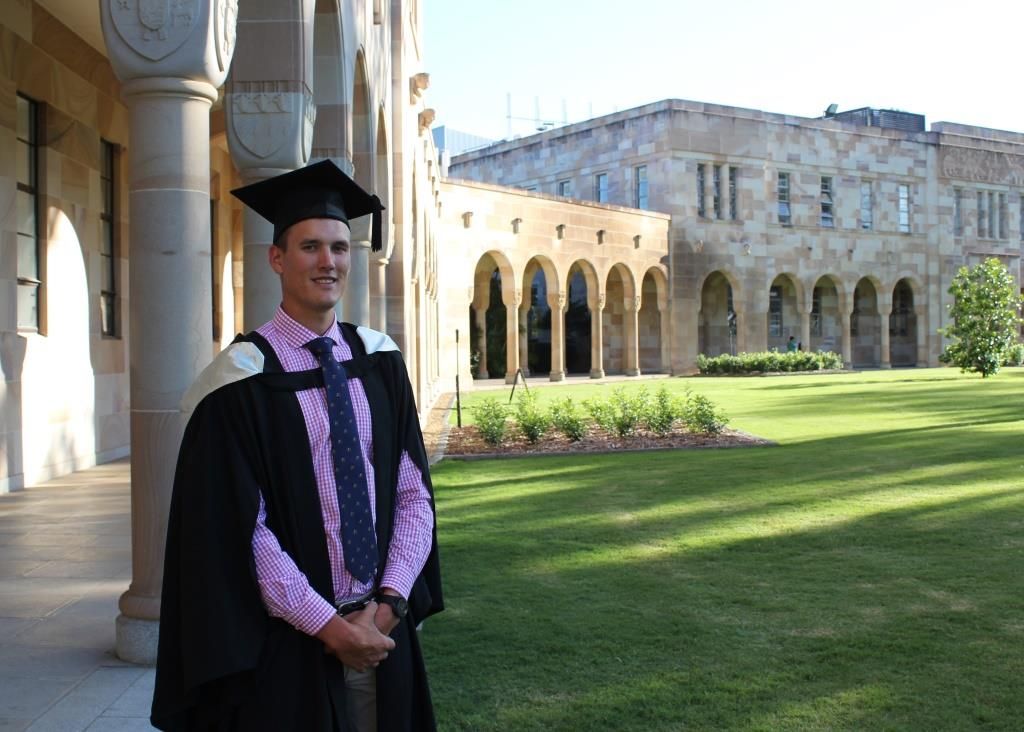The day John’s life changed forever…

Friday 14 December 2012 is a date that John recalls quickly and without hesitation.
It’s the day that his life was changed forever.
Just hours before graduating university with a degree in engineering, John was diagnosed with cancer. The devastating news was delivered during a celebratory lunch between John and his family.
Some months earlier John, only 21 years old at the time, decided to sit the required exams and try his luck at entry into studying medicine.
To his surprise, he was accepted and due to start studying medicine at The University of Queensland the following year.
“To study medicine, there are some compulsory medical checks that need to be completed and it was during that check-up that I queried a lump on my leg with my GP,” John explained.
“I was referred to a general surgeon and he was very positive and reassured me it would be nothing.”
But surgery and tests on the lump revealed the worst. John was diagnosed with a rare form of blood cancer, called nodular lymphocyte predominant Hodgkin’s lymphoma.
“We were at the Regatta Hotel in Brisbane having lunch as a family before heading to the uni for my graduation ceremony when I got the call,” John said.
“My surgeon told me I had blood cancer and I would need to see an oncologist as soon as possible.
“At that stage I really didn’t understand what was going on, it knocked me for six. I went back to the table and told my parents and we cried.”
In his mind, John was still looking forward to graduating and celebrating with friends at the beach over the weekend. He could never have prepared himself for such devastating news.
“The last thing you want is to be diagnosed with cancer before the holidays. From there everything moved at an extreme pace,” John said.
More tests followed, including an excruciating bone marrow biopsy before John began chemotherapy treatment on New Year’s eve.
“Again any plans to celebrate were out the window. My first day of chemotherapy was a very long and hard day,” John recalls.
John continued receiving chemotherapy treatment twice a fortnight for six months and then monthly for another two years.
Inspirationally, he found the courage to begin and continue studying medicine throughout his treatment.
“I would have treatment on a Friday, be extremely sick all weekend and then go back to university on Monday,” John said.
“I have never felt so terribly sick ever before in my life as I did after chemo.
“I also had a lot of anxiety about the treatment, so I would start feeling the sickness again before I had even been back to have another round.”
But four years on, John is now in remission and proud of how he made sure cancer changed his life for the better.
“I learnt quickly how to make something good out of something bad. Cancer will shape my future, especially my future career as a doctor,” John said.
“I want to use my career to give back to those who need it—that will be the biggest reward for me.”
Although in remission, John faces the very real possibility of cancer returning in the future.
“It’s something that I have accepted—you never know what can happen in life, so I am not going to worry until it happens,” John said.
“And if it does come back, we will tackle it then with better tools and new treatments that will be available.
“I’m only alive today because of the advances in modern medicine, and the support provided by others. Organisations like Mater Foundation made a difference in my life.”
Just last year, John graduated his degree in medicine and is now working as a doctor on the Sunshine Coast.

We would love to hear from you
We would love to know what you think about Mater Lotteries!
1800 067 066
All times displayed in your local timezone unless stated otherwise. Mater Foundation Ltd as trustee for Mater Foundation is registered as a charity with the Australian Charities and Not-for-profits Commission. ABN 96723184640. All prices are displayed in AUD.



